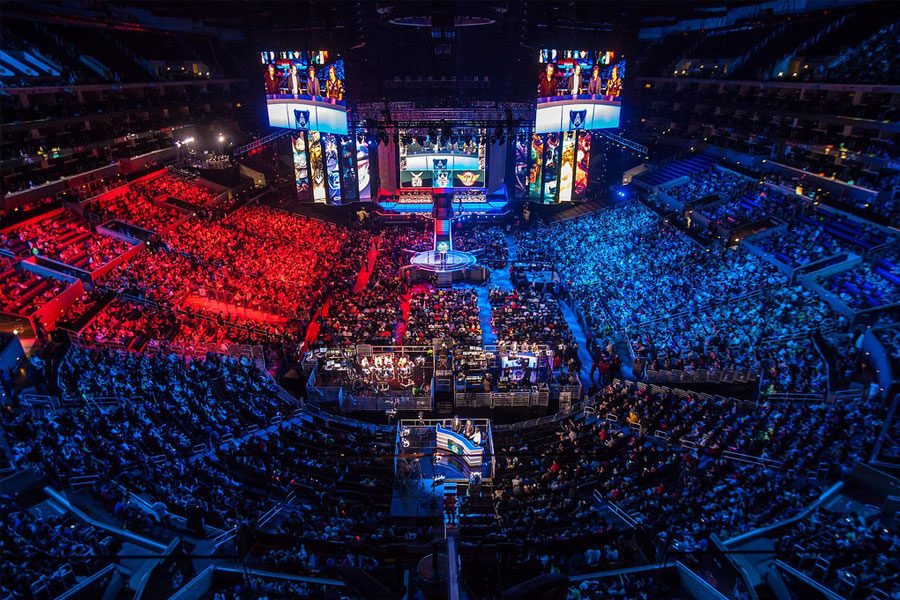eSports on the rise
April 20, 2017
It’s no question that sports at HB are a large part of students’ lives, whether students are part of the team or just spectators. However, a new demographic is surfacing around the world: eSports, competitive video games played in front of large crowds of dedicated fans.
The eSports experience is similar to normal sports – like basketball or football – with the primary difference being that one takes place electronically. Rather, the majority of video games favored in the eSports platform focus on split second decision making, strategy and reflexes. Strangely, that sounds a lot like traditional sports, doesn’t it? And just like traditional sports, the idea of a high school eSports team has been implemented before – New Zealand has recently started their own nationwide eSports league for 50 high schools. Is HB very far off?
In the December 2015 finals for popular eSport video game League of Legends, viewership peaked at 36 million viewers globally. In the June 2016 NBA finals, the Cleveland Cavaliers defeated the Golden State Warriors in a thrilling match – LeBron James had arguably one of the best performances audiences had seen that year. The match garnered over 31 million viewers from all over the world, the highest viewership count in a decade according to the official NBA website.
League of Legends attracted more attention than the NBA finals.
Granted, interest in basketball outside of the US is very minimal, while interest for League of Legends is worldwide, and thus, much higher. However, the figures still stand. The introduction of video games into the mainstream media is very recent, and it is already making waves and challenging other forms of sport. To compare even further, the 2016 Superbowl drew in 167 million people – nearly five times as many viewers – and the 2016 Stanley Cup had 5.4 million views – a measly seventh.
Paul Considine ‘18 is an HB student ranked as a “Diamond” player in the Starcraft II competitive mode, putting him roughly within the top 18% of players. Starcraft II is a highly popular and successful game in the eSports scene. Just in 2015, the combined prize pool for the world finals was $250,000. When asked about eSports, Considine said, “I believe that [Starcraft II] is a very competitive game, but sports are something physical.” Continuing, he said, “You need practice just like in football, but you also practice guitar. Guitar isn’t considered a sport, but I can compete in a guitar competition. The same goes with ‘eSports’. I’d say that yes, it [eSports] is a very important thing, but I wouldn’t call it a sport.”
While the point that Considine presents is certainly valid, it’s not infallible. One could argue that, because Considine put practice into what he did in order to be achieve his skill, his game could be considered a sport. Starcraft II’s competitive nature also draws comparison to sports, which involve people directly competing with one another. For example, two teams running back and forth across a court in the traditional sport of basketball, or two people sitting across from each other over a board in the mental sport of chess explicitly involve direct competition. With an instrument or music, there can be competition between artists, but the music on its own isn’t a source of that competition. Someone’s skill with a guitar falls more under an art, as does music and writing. With competitions like basketball, football, chess, and even Starcraft, the goal is clear: to win against the opponent. These points continue to be topics of debate between those in favor of and against games like Starcraft being formally recognized as sports.
Cameron Casciotti ‘18 went to Eastern Michigan University at the beginning of April to watch his older brother, former student of ‘15 Ian Casciotti, participate in a local Counter Strike: Global Offensive tournament. Interestingly enough, Hiko, a professional CS:GO player himself, was present to act as a caster for the tournament. “My brother’s team made it to 6 out of 27,” Casciotti said. “It was really cool to be surrounded by other nerds like that. Sadly he didn’t win anything, but I entered a raffle for some stuff, and got a new mouse out of the trip.”
Despite how one may feel on the sport vs. not a sport argument, one thing is evident – eSports, as a form of competitive entertainment, are on the rise, and they may very well be here to stay.














